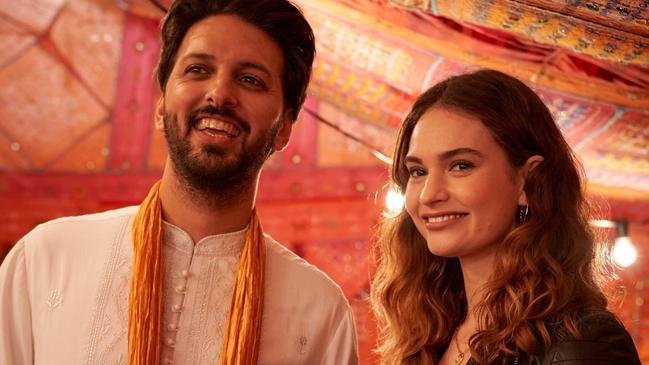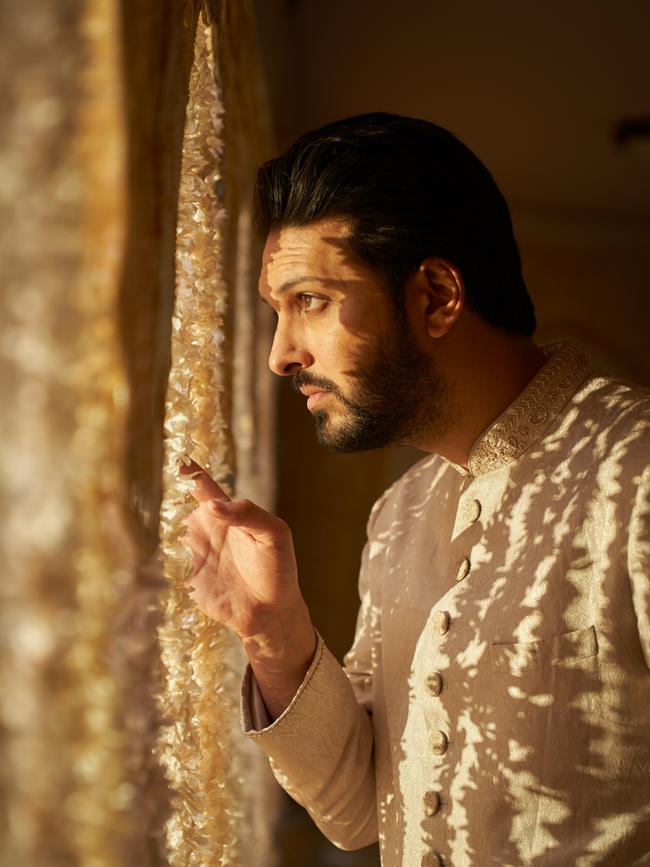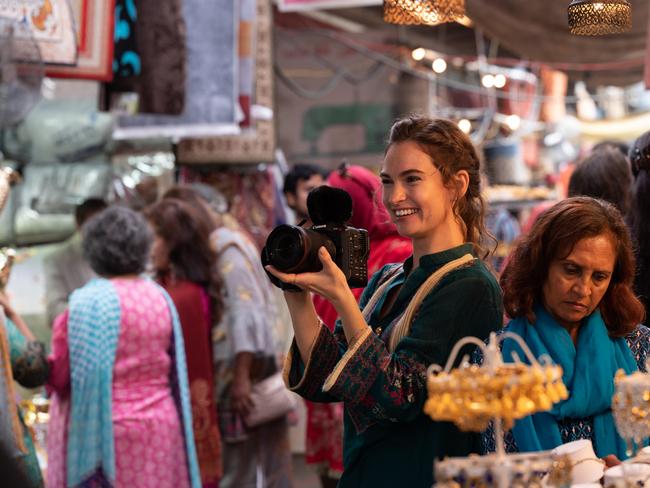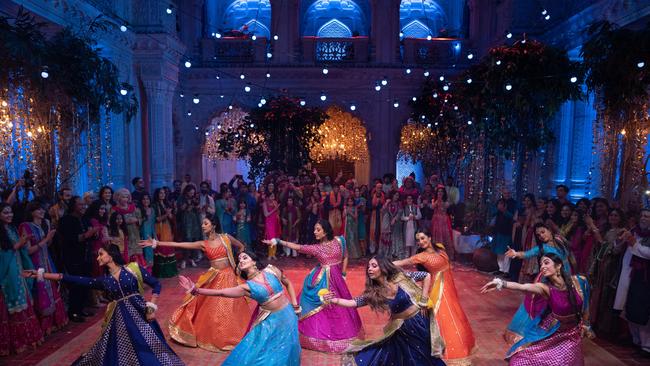Brave new world of rom-com embraces Pakistan
A romantic comedy written as a ‘love letter to Pakistan’, with a British-Pakistani leading man, takes the genre to new audiences.

When Shazad Latif walks into a room, he takes it up. If not with sheer height, then with his broad smile, that designed-for-the-silver-screen mega wattage. Sitting in a Sydney hotel lobby, the British-Pakistani actor and star of upcoming rom-com What’s Love Got to Do With It? also has a confession to make. He spent the last year on the Gold Coast, filming Disney+’s new series Nautilus – in which he plays Jules Verne’s intrepid Captain Nemo – right by the strip of theme parks that makes the seaside city a tourist magnet, but he hasn’t been on a single rollercoaster. “Ever since I was little, I couldn’t handle it. Not even the little teacup rides.” He shakes his shoulder-length hair, pushed back roguishly. “Nah, man. I just get the Bugs Bunny T-shirt and walk out.” Fair enough. Like his latest film, it seems Latif has an unexpected side to him.

From the outset, What’s Love Got to Do With It? takes pains to make clear it is not a typical rom-com. At the heart of it is a Pakistani family, whose eminently eligible doctor son, Kazim (Latif), is being primed for an arranged marriage by his well-meaning parents (played by Shabana Azmi and Jeff Mirza).
Kazim is best friends – and neighbours – with Zoe, played by Lily James, a documentary filmmaker who decides to record Kazim’s journey into arranged marriage and make it her latest project. Zoe’s mother (Emma Thompson) is politically incorrect but well-meaning, and forges a friendship with the family next door – though how they withstand her terrible jokes about butter chicken boggles the mind.
No, What’s Love Got to Do With It? is not your typical rom-com, in that it features Pakistani characters. Except that it is, in almost every other way. Zoe, the true emotional nexus of the film, plays the archetypal career woman who can’t find a boyfriend because of her aforementioned career-focused ways. She dates a wet sponge of a man while secretly pining after another. She falls, slowly but surely, in love with the boy next door. Forbidden love turns out to be the most exciting, the most erotic. Are any of these things really spoilers, given the well-trodden path films in the genre usually follow?

For Latif, the fact the film plays to type in most ways isn’t a negative. It allows a new audience into a familiar story, and widens the possibility that traditional – white – rom-com audiences will engage with stories that focus on another culture.
“You stay within the formula, but then you add layers,” he says. “The family drama of the film is something that I think a lot of Asian people will relate to. Especially my cousins, my family, they’d rush to the cinema to see something like this. It’s a big deal for that community.”
Others may come to the film because of its notable screenwriter. What’s Love Got to Do With It? was written and produced by Jemima Khan (nee Goldsmith), who was once married to the former Pakistani prime minister Imran Khan. A tabloid magnet in the ’90s, she was also once a close friend of (and often photographed with) Diana, the late Princess of Wales. In recent years, she has established herself in the TV industry producing projects such as The Case Against Adnan Syed and American Crime Story.
Khan says she drew from her own experiences to tell this story. It was a result of her 10 years living in Pakistan, from age 20 to 30. “My intention was to write something that was a celebration of all things Pakistani, a kind of love letter to my old friend, Pakistan,” she writes in a director’s statement.

Jemima Khan was, in fact, an important figure in Latif’s family when he was growing up, unbeknown to her: because of her marriage to Imran Khan and the glamour that surrounded her, his mother kept a scrapbook of pictures of her. “I grew up with pictures of Princess Diana and Jemima, because they were two of the only very few white women that had been to Pakistan and seen it for what it is … not just, you know, what the media portrayed it as,” he says. When he went into the audition, he told Khan about the scrapbook. “I was like, ‘I know it’s weird, but it’s the truth!’” he laughs. “She’s such an important figure in the Pakistani community, and in the British-Pakistani community.”
During the casting process with Khan, “it just felt right”, Latif says. “My dad’s family is from a small farming village (in Pakistan), and she knew where it was. It all just fell into place. We immediately connected.”
When Latif learned director Shekhar Kapur (Elizabeth, Four Feathers) was on board, it was a done deal. But it was Kapur’s first time behind the wheel of a rom-com: his work has been historical and dramatic, and rarely this light. But collaborating with Working Title films – the house behind films like Four Weddings and a Funeral and Love Actually – gave him the romantic comedy backing needed.
Romantic comedies are also new to Latif’s repertoire. “But I’ve always loved watching rom-coms growing up,” he says. He reels off his favourites, from Amelie, with Audrey Tatou, to British classics such as Notting Hill and Love Actually. “And I think this movie is a great addition (to the genre).”
One of its most charming elements might be the easy chemistry between Latif and James: and it’s not just the product of savvy casting. The pair have been friends for years since meeting at drama school. His housemate was dating her at the time. “It was just years of partying and, you know, being young actors and on the scene.”
Now, in a different time in their lives, Latif feels grateful they can work together and “protect each other” in the chaos and constant activity on a film set. In 2021, they had their first taste of working together when they co-starred in the BBC miniseries adaptation of Nancy Mitford’s novel of the same name, The Pursuit of Love. “(A set) is a vulnerable place, you know? You’ve got to be very emotionally available.”

But as much as he loves rom-coms, Latif isn’t about to be the next Pakistani Hugh Grant. He wants to have a “varied career”. “Like, this one’s about me being Asian, this one isn’t. I just want to work with great directors,” he says. Paul Thomas Anderson (Licorice Pizza) and Pedro Almodovar (Volver, Pain and Glory) are on that list. When it comes to picking films, it’s all about how it makes him feel. “If I react to the story, if I read it like a poem and it ignites feelings in me, then maybe it’s worth trying to do that for someone else.”
So what does it mean to play a brown man as a romantic lead in a world where brown men are not usually portrayed as desirable? “We’re so far behind,” rues Latif. “I remember about 10 years ago, auditioning for something where they said that having the lead girl with a brown guy … well, that they were ‘not sure of the connotations of it’.” What in the world did they mean by that? “Exactly.”
“It’s now the time,” he says. “Let me tell you a different story.”
What’s Love Got to Do With It? is in cinemas Jan 26.

To join the conversation, please log in. Don't have an account? Register
Join the conversation, you are commenting as Logout